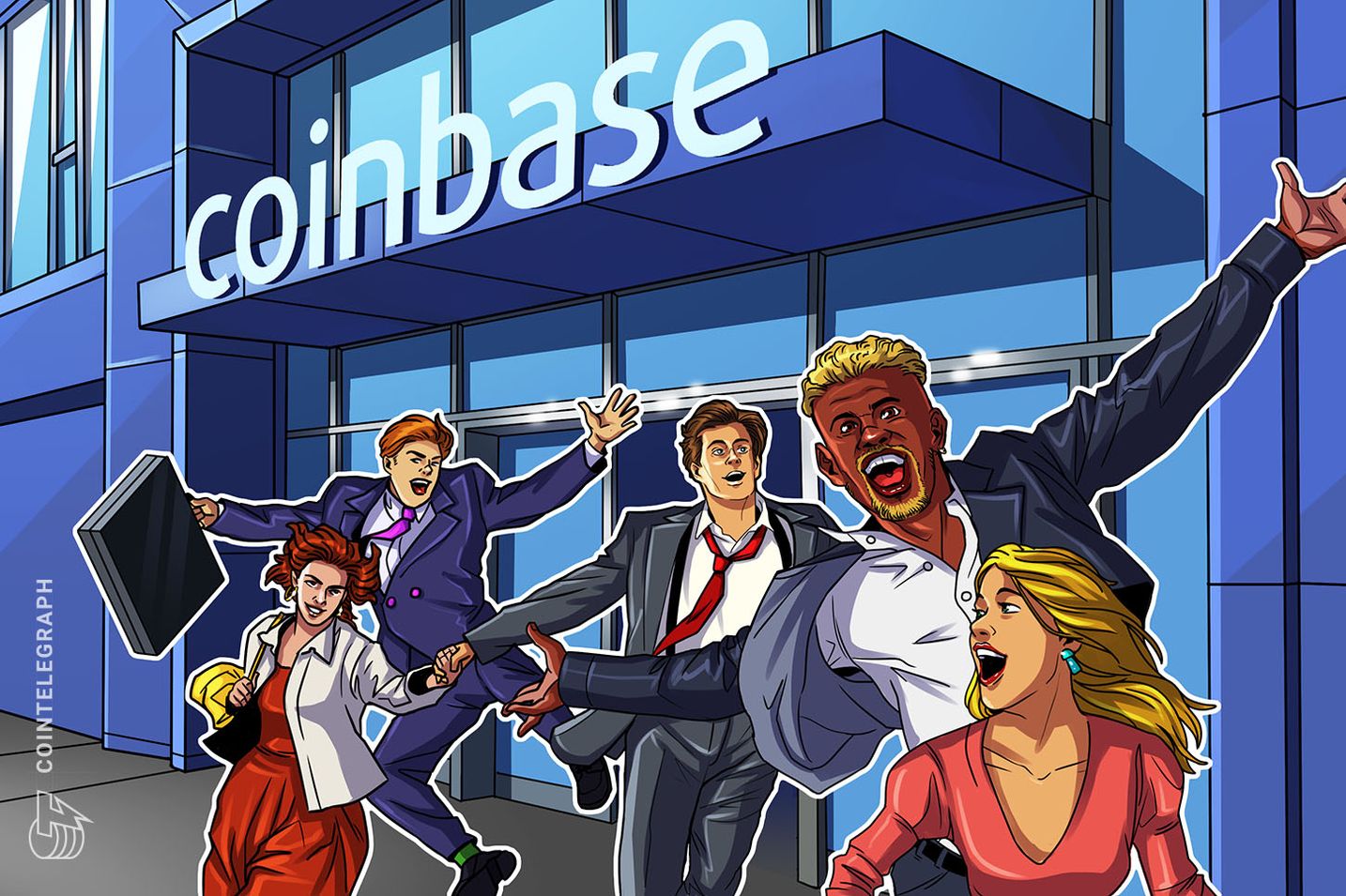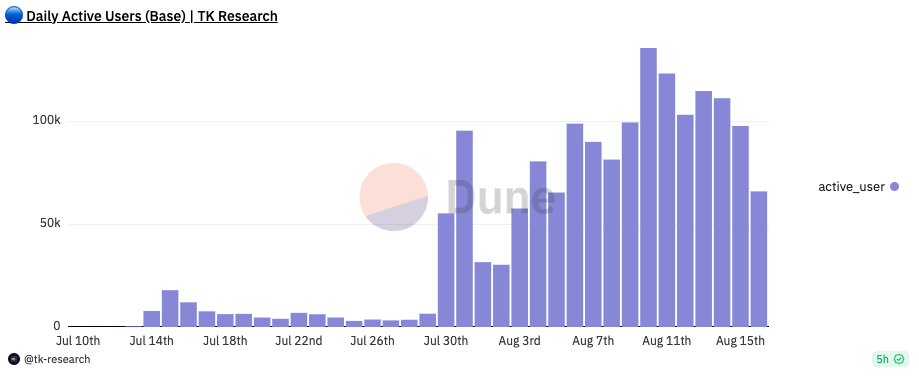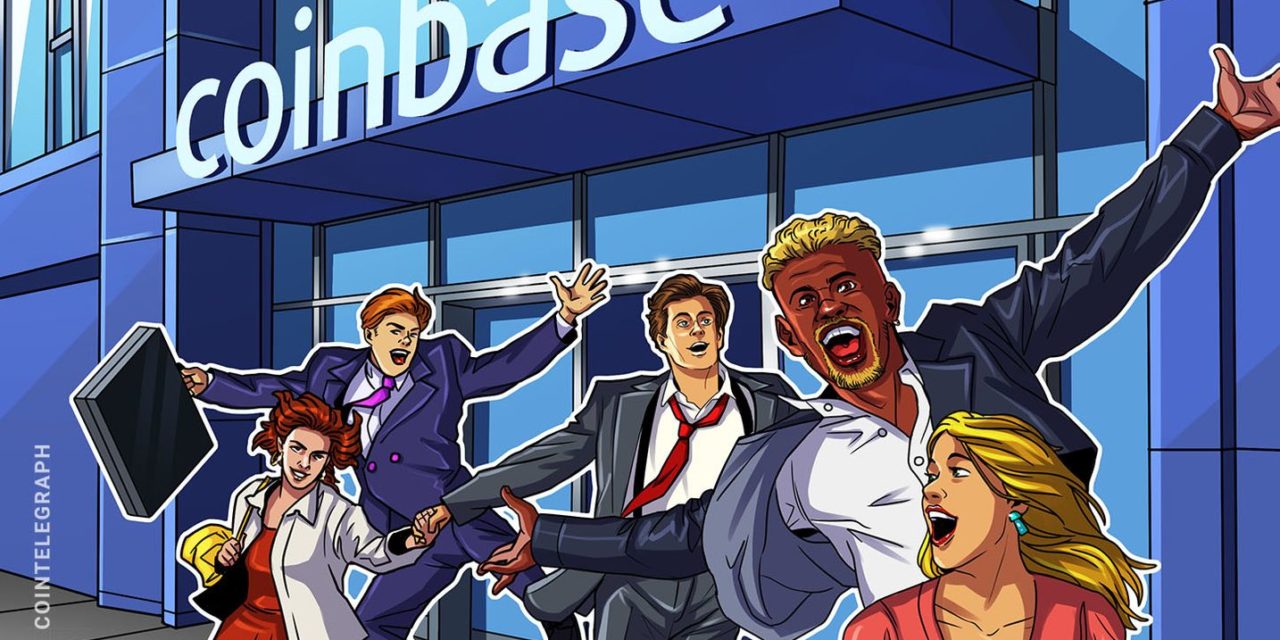Tento príspevok bol pôvodne publikovaný na stránke https://cointelegraph.com/news/coinbase-base-network-first-seven-days-of-onchain-summer a autorom článku je Cointelegraph By Tom Mitchelhill. Tento článok je iba kópia originálneho článku.
https://images.cointelegraph.com/cdn-cgi/image/format=auto,onerror=redirect,quality=90,width=840/https://s3.cointelegraph.com/uploads/2023-08/a2706eb7-9394-4693-8d21-0288906e86d8.jpgIn just one week, Base has attracted hundreds of thousands of new users, attention from mainstay brands and artists, and unfortunately, scammers as well.

Follow up
It’s been an eventful week since Coinbase launched its new layer-2 network Base to the public, bringing with it a frenzy of activity from everyday crypto users, major brands, and more unfortunately, some bad actors as well.
Coinbases’ Onchain Summer festival — a three-week-long campaign celebrating the launch of Base — has seemingly attracted a flock of new users to the ecosystem.
As of Aug. 16, more than 700,000 new users have joined the Base network, and have since bridged a total of $242 million to the network, according to data from Dune Analytics. Activity on the chain peaked on Aug. 10 with more than 136,000 daily active users.

In total, the flurry of activity on the network has generated a staggering $2.8 million in fees and has seen the total value locked (TVL) climb to $170.5 million, according to data from DeFiLlama.
The network also announced involvement from one of the world’s biggest soft drinks brands, Coca-Cola, which released its own non-fungible token (NFT) collection on the network.
ᴏɴᴄʜᴀɪɴ ꜱᴜᴍᴍᴇʀ@CocaCola is bringing their Global Masterpiece campaign onchain with iconic works from leading artists.
Mint now: https://t.co/xTWyI3O7IW pic.twitter.com/9wxFgt8qOh
— Coinbase ️ (@coinbase) August 13, 2023
Crypto-native organizations are also making their way to network. On Aug. 16, DeFi derivatives protocol Synthetix revealed that a motion for it to be deployed on the Base network had been unanimously passed by members of its governing DAO, the Spartan Council.
SIP 336: Deploy Synthetix V3 on Base has been approved by the Spartan Council.
It’s only a matter of time. pic.twitter.com/CIEM0is69y
— Synthetix ⚔️ (@synthetix_io) August 16, 2023
One of the most notable product launches on Base was the decentralized social (DeSo) network Friend.tech, which allows crypto users to tokenize their social network, by buying and selling “shares” of their friends. Since its launch on Aug. 11, the social media platform has seen some 7,736 Ether (ETH) in trading volume, according to data from Dune Analytics.
https://t.co/L11mNJZgY3 is built by @0xRacerAlt, a crypto OG.
He was the lead dev of @TweetDAO – an NFT which granted access to posting from a shared Twitter account.
The project went viral before devolving. It was one of the first forays into decentralized social media. pic.twitter.com/3wGo0aQ2Ip
— yuga.eth (@yugacohler) August 11, 2023
Music NFT platform anotherblock launched on Aug. 14, featuring never-before-heard on-chain releases from electronic music producers Boys Noize and Laidback Luke.
Binance-owned self-custody service Trust Wallet and enterprise-grade digital asset platform Fireblocks have also added support for the Base Network since its public launch.
Ethereum advocate Anthony Sassano shared his praise for the broader move towards decentralized applications and on-chain activities, predicting that centralized exchanges will eventually become nothing more than fiat ramps.
That would be a silly lawsuit imo
If done right, Base can be a huge growth driver for Coinbase as it acts as the best “front door” for Base
My long-term thesis is that pretty much all CEXs will be relegated to just being fiat ramps – onchain will replace the other things
— sassal.eth (@sassal0x) August 12, 2023
Bad actors find new base
Despite the general tone of enthusiasm from the wider crypto community, the launch of the network has also drawn the attention of nefarious actors, with a number of exploits and rug pulls since its public launch.
On Aug. 14, one of the top decentralized exchanges (DEX), RocketSwap revealed that they had suffered an exploit, with an estimated $865,000 being stolen from the protocol.
The most recent incident came on Aug. 17 when crypto lender SwirlLend carried out an “exit scam” — otherwise known as a rug pull.
Update: SwirlLend rugged both on #Base and #Linea. The scammer has already bridged ~94 $ETH from #Linea to #Ethereum via Orbiter Finance: Bridge and and is currently in the process of transferring the stolen funds from #Base to #Ethereum
The current balance of the scammer’s… pic.twitter.com/zexiNuFVhs
— PeckShieldAlert (@PeckShieldAlert) August 16, 2023
After wiping its social media accounts and deleting its website, SwirlLend reportedly transferred roughly $290,000 worth of cryptocurrency from Base, as well as an additional $1.7 million from Linea. It then laundered a total of 253.2 ETH through the Tornado Cash crypto mixer.
Related: Coinbase app is ‘broken’ for UX, admits CEO Brian Armstrong
Bad actors have however been circling the network since its mainnet launch for developers. On July 31, when a Brian Amrstrong-themed memecoin dubbed “BALD” lost 85% of its value after the developer suddenly withdrew $1.9 million in liquidity from the token’s pools. The developer has denied orchestrating a rug pull.
The following day, Base’s then-largest decentralized exchange (DEX) LeetSwap announced that some of its liquidity pools had been compromised with losses topping $600,000.
Deposit risk: What do crypto exchanges really do with your money?



